#SHOCKLEE
Explore tagged Tumblr posts
Text

Today in Hip Hop History:
Keith Shocklee of The Bomb Squad was born January 2, 1962
#today in hip hop history#todayinhiphophistory#hiphop#hip-hop#hip hop#music#history#hip hop music#hip hop history#hip hop culture#music history#keith shocklee#bornday#birthday#the bomb squad#producer#music producer#public enemy#1962
46 notes
·
View notes
Photo




Some images of early Public Enemy with Keith Shocklee, Chuck D, Pete Nice from upcoming “Spectrum City” documentary
42 notes
·
View notes
Text
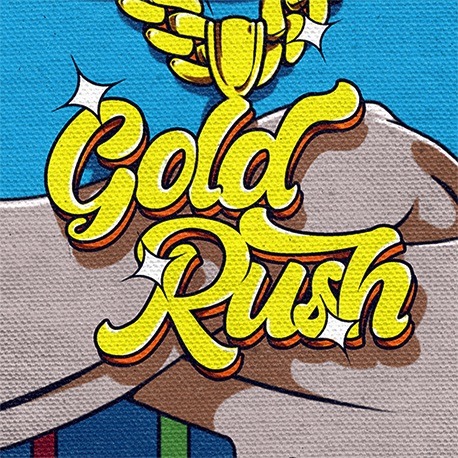
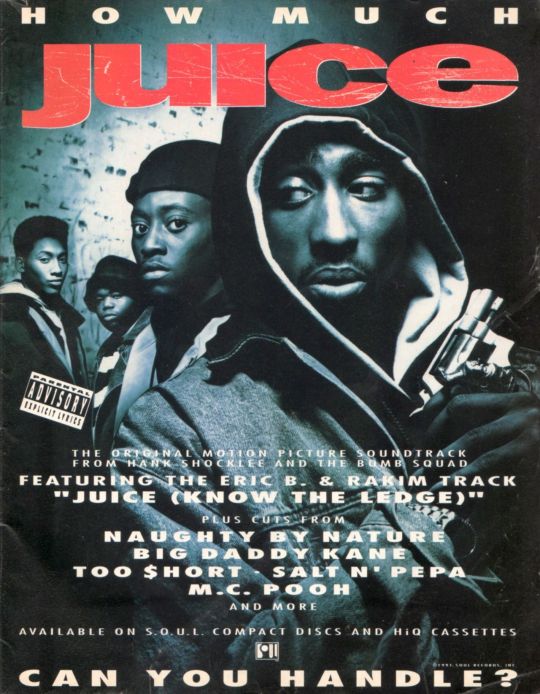
Stupid Fly's Gold Rush Podcast, Episode 8 (Season 1 Finale): "Is 'Juice' The Most Hip-Hop Movie Of All Time?": LISTEN HERE
#StupidFly#HipHopGoldRush#Juice#Tupac#2Pac#Omar Epps#Ernest R. Dickerson#1992inFilm#1992inMusic#2023inPodcasts#Kathy Nelson#Know The Ledge#Eric B. & Rakim#Hank Shocklee#808s#MURS#podcast#hip hop#rap#music history
3 notes
·
View notes
Text

#HIP HOP LEGEND ✨ #THE BOMB SQUAD 💣
#HBD KEITH SHOCKLEE
🎊🎉🥳🎂♑💿🎼🌹💘👑🎤✨
2 notes
·
View notes
Text
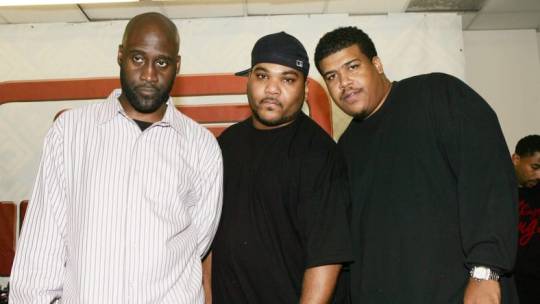
Editor’s note: The following article is an op-ed, and the views expressed are the author’s own. Read more opinions on theGrio.
Crack had a massive impact on the Black community in the 1980s. It would be impossible to do a podcast like “Being Black: The ’80s” and not talk extensively about crack. People smoked it and experienced the most intense high they had ever had, and the chase to feel like that again ruined millions of lives.
De La Soul is not one of the hip-hop groups that talked a lot about street life. They were proudly suburban at a time when that made them stand out among hip-hop artists. Quick story: I was a suburban kid who loved hip-hop from the first time I heard “Rapper’s Delight,” and I felt deeply connected to hip-hop as I watched the culture grow in the years after that song dropped. Hip-hop was the music I loved most as a kid. It was part of my identity, but then De La came out and I realized that as far as rappers, no one represented me or symbolized me better than De La. If I could rap, they were what I would be. Their suburbanness, their intelligence and their sense of humor all spoke to who I was. They became my favorite group of all time. But I digress. Even though De La was all about everything that rappers weren’t normally about, like so many Black people back in the ’80s, they did have a crack problem in their family.
Crack was so pervasive in the ’80s that living in suburbia was not enough to insulate you from the crack epidemic. De La’s Posdnous had a brother who was battling a crack addiction, and out of that experience he recorded the best song ever made about being in a family with a crack addict: “My Brother’s A Basehead.” That song is at the center of episode two of “Being Black: The ’80s,” and it leads us into a conversation about the overall impact of crack.
“My Brother’s A Basehead” is one of those songs that spring from the artist’s real life. Posdnous is telling the story of what happened to him and his family because of his brother’s addiction. It wasn’t quite a cry for help because Posdnous himself wasn’t in trouble, but it was perhaps a way of Pos speaking to his brother about hurting the family. Producer Prince Paul, who’s sometimes referred to as a member of De La, comes through in this episode to talk about the making of the song and what really happened to Pos’ brother.
Meanwhile, another major hip-hop group was dealing with having a crack addict in the family in a whole different way. Public Enemy was, in many ways, the exact opposite of De La. Where De La was about having fun and being smart, Public Enemy was overtly political and they were as serious as a heart attack. They positioned themselves as the sons of Malcolm X and the Black Panthers so you knew they were going to decry the crack epidemic as often and as loudly as possible.
Quick aside — one of the hallmarks of “Being Black: The ’80s” is that I generally bring up a second song as a way to help further explain the episode’s central song. In this episode, that second song is Public Enemy’s “Night of the Living Baseheads,” which is Chuck D’s way of sermonizing about the evils of crack and shaming those who used crack. P.E.’s producer Hank Shocklee comes through to explain the origins of the song, which goes back to a movie he saw in his childhood — “Night of the Living Dead.”
But it was very interesting to hear Public Enemy shame crackheads while there was a crack addict in their musical family. Flavor-Flav battled addiction for years, including while he was in the group. I asked Shocklee if they knew that Flav was doing crack. He said, “Yes and no.”
You’ve gotta hear the whole story of how De La and Public Enemy dealt with crack in their families in very different ways. That, and the impact of crack, is at the heart of episode two of Being Black: the 80s. Available now wherever you get your podcasts.
#‘Being Black: The ’80s’: De La Soul’s song captures the devastating effects of the crack epidemic#DeLaSoul#De La Soul
2 notes
·
View notes
Text
1 note
·
View note
Text
Everyone was laughing at LL Cool J.
It was the fall of 1984, and the 16-year-old rapper also known as James Todd Smith was full of confidence as he jumped on the mic at a block party in his native Queens. Not only had he recently inked a record deal, but he’d just cut his debut single “I Need A Beat” in a real studio. His bars at the party garnered love… but then things went left.
“My record’s coming in November!,” he shouted to the onlookers with brash smile as he put the mic down — only to have another young dude pick it up and yell “Stop lyin!”
The entire block erupted into hysterical laughter, or so it seemed. “Everybody thought I was lying,” the now-56-year-old artist says with a smile.
LL took an L that day, but he had the last laugh a long time ago. And late last month, just a stone’s throw from that block, he was back in the neighborhood that spawned him for another block party — the annual Farmers’ Day — and for the hoop championships of his LL Cool J’s Jump and Ball Community Camp. And, of course to celebrate his 40 years as the superstar they didn’t believe he was.
Later that week, just a couple of miles away, he also would celebrate the 40th anniversary of Def Jam Records, his label then and now, as part of an all-star performance at the MTV VMAs by Public Enemy, Busta Rhymes and other veterans of the company’s storied roster. (This is part 2 of Variety‘s extensive interview with LL Cool J, head here for part 1.)
“The moment felt full circle,” LL said of the performance. “The sweetest part about it is I got to have my friends Public Enemy by my side. It was dope.”
Public Enemy’s Chuck D, a fellow area native., says, “It was surreal, because we were [performing at the UBS Arena in Elmont, New York] only blocks away from where he grew up. The arena is right on the borderline of Long Island and Queens, so it was sort of a throwback moment. Maybe 40 years ago, I was promoting a concert in Elmont, and [a group named] the Mastodon Committee didn’t show up, and I was scrambling.” Public Enemy producer Hank Shocklee mentioned that he’d gotten LL’s number at a T-La Rock concert.
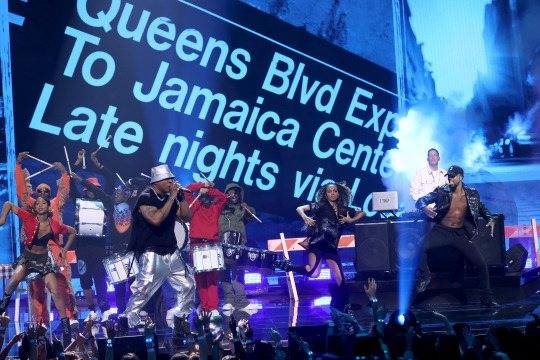
“I said, ‘What the hell is a LL?,’” Chuck chuckles. But he cold-called LL on a Friday night and asked him to judge an MC contest. Not only did he judge, he also rapped for the crowd for 10 minutes while New York’s Dr. Dre, who would go on to co-host “Yo! MTV Raps” years later, cut and scratched records.
A year or so later, LL was a major star, and he’s been one ever since.
“He was and is the coolest,” says Grammy-winning Atlanta rapper Killer Mike. “All the girls loved him, the older dudes respected him, the little dudes looked up to him. I remember mowing lawns to earn money to buy his music — ‘I’m finnin’ to get ‘Bigger and Deffer’!,’” Mike recalls with a laugh. “He was young, Kangols and leather from top to bottom. He was everything to me that was the coolest in rap at the time. When I was a kid, Michael Jackson and LL came to town and the same time. My mother said ‘You can see one or the other’ and I said ‘I’m going to see LL Cool J!’”
“I call LL the GOAT because he proved it musically,” says LL’s favorite rapper, Big Daddy Kane. “He has a catalog as big as many pop stars and he’s been victorious in many rap beefs.”
“I am so proud of him,” says veteran executive Lyor Cohen, who is now YouTube’s global head of music but began his career in the early ’80s at Rush Management and Def Jam, where he worked closely with LL for many years. “His creativity doesn’t stop. From Queens to Hollywood, performing around the world, he’s an inspiration and a north star for every artist to continue being creative.”
Yet his home borough of Queens has remained a vital part of LL’s life. He might have moved to L.A. and had a 14-season run on “NCIS: Long Angeles,” but he’s always come back to his neighborhood. And on August 31, a few days before the release of his first album in 11 years, “The FORCE,” he was back for a stroll through Farmers Day. After that, he went to Daniel O’Connell Playground in St. Albans for the hoop championships of his LL Cool J’s Jump and Ball Community Camp. He established the free camp in 2005 to help children learn basketball, team-building and leadership skills. He goes back every year.
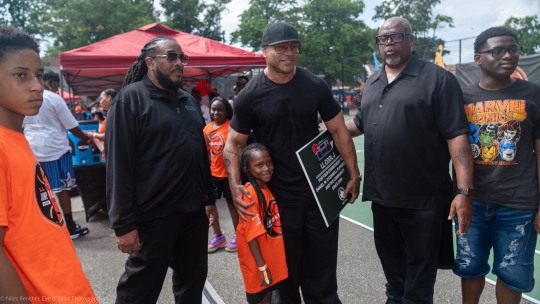
Derrick Davis, chief of staff and senior adviser to New York State Senator Leroy Comrie of District 14 in Queens, presented LL with a plaque to honor his commitment to the neighborhood.
“We wanted to acknowledge what you do, not only for this park, but for the community — your community,” Davis said. “You’ve never changed, you’ve always been LL Cool J.”
In a short acceptance speech, LL said, “Thank you to the Parks Department and everyone who’s been contributing to this event for 17 years now. To the coaches, you guys have done an amazing job with the kids. To all of these young ones out here playing and having fun, I’m happy to see you guys doing what you love. It’s an opportunity for you to get closer to your dreams and away from everything else that will distract you. That being said, I’ll say this community has a lot of great DNA. In this community, you can do anything if you put your mind to it. If I can make it off the streets of Queens, so can you.”
Yvonne McNair, CEO of Captivate Productions says “There are kids who have gone on to college and have come back to support the younger generation of camp participants because it meant so much to them growing up.” LL and his manager of 25 years, Claudine Joseph, raised all the money for the Camp themselves for the first 13 years before bringing on sponsors. Two years ago, McNair was brought on to be a Jump and Ball Camp producer.
“It really embodies the spirit of true community, and it has been such a joy to see and be a part of what LL has built with this amazing event,” McNair adds.
After countless selfies and autographs, LL says, “When you love your community and they give you that love back, it’s a hell of a feeling. I’m just glad I can do it.”
He buys a strawberry sundae from a Mister Softee truck and stops for more photos in front of wall with murals that includes ones of himself and fellow Queens native and “FORCE” producer Q-Tip, from the foundational hip-hop group A Tribe Called Quest. “That’s trippy,” LL says.
Turning more serious, he says, “The main thing I’m trying to show the community is that [achieving dreams] is possible. I appreciate the accolades and the respect and the love, but it’s more about the example it sets for them to do their own thing. And dreams don’t have deadlines: Colonel Sanders started Kentucky Fried Chicken at 65 years old, B. You may feel that your best entrepreneurial years or dreaming years are behind you, but they’re not.”
He’s trying to prove that point with his latest album, with a goal of being “culturally relevant,” as he puts it.
Veteran producer 9th Wonder agrees. “It is very important that our heroes and greats in hip-hop continue to work,” he says. “Sometimes we figure that we don’t have a lot to say or do in this culture, which has a lot of people in their teens and twenties. We never prepared for what happens when our greats get [older]. That’s what makes this album important.”
A week after his album was released, at least part of LL’s dream has come true: His songs are getting playlisted alongside much younger stars. “For real — this is not arrogant, tough talk. But yo bro, my first song came out in ’84, and [my new songs] are on playlists with Lil Durk and Megan Thee Stallion and Glorilla and Sexyy Red right now. LL Cool J is on the same playlists, B! This is facts.”
Havoc from Mobb Deep says, “The album is a Queens street sound, but it’s universal. Everybody could listen to this — I’m listening to it and I could see my kids listening to it.”
LL and producer Q-Tip reached out to nearly a dozen MCs to jump on songs starting with fellow legends like Snoop Dogg, Eminem, Nas, Fat Joe, Rick Ross and Busta Rhymes.
“From Nas to Bus to Marshall [Eminem], everybody was excited to work with him,” Q-Tip says.
Nas says with awe, “I used to write in my room as kid, trying to find words to flow like the words he used, so being on his new album is still something I can’t believe. I used to hope one day he would know who I was.”
“He’s my idol — he’s the sole reason I rap,” says Fat Joe, who is featured along with Rick Ross on the album’s lead cut, “Saturday Night Special.” “Anytime I stand next to him or do a song with him or collaborate with him, it’s like a dream come true — it puts me back into the memories of me as that kid in Forest Projects who had the ‘I’m Bad’ poster on the wall. There is no bigger honor and privilege.”
With the legends locked in, LL next reached out to underground rappers Mad Squablz, J-S.A.N.D. and Don Pablito for “The Vow,” then he called up a top female rapper for the album’s radio and dancefloor moment.
“He’s a true pioneer who continues to evolve and pays attention to the younger generation of artists,” says Saweetie, who guests on “Proclivities.” “I felt so honored that LL tapped me to be a part of his album. I grew up listening to his music with my parents.”
The esteemed cross-generational company inspired L to step up his own game — he was determined to tap into new flows and concepts, and make sure all of his lyrics penetrate.
“He sounds sharper than ever,” Jadakiss says. “I think a lot has to do with his staying in great shape and still looking like a young wrestler or linebacker,” he laughs. “That has a lot to do with breath control and what he’s doing with the flows and cadences.”
L admits that he lost a little steam and motivation with the poor reception of his last project, “Authentic,” in 2013. L calls that album “experimental”; it is the only album of his entire career not on Def Jam Records.
“I found out a few things,” he reflects. “One, you can’t be a part time artist,” as he was juggling the album with his commitment to “NCIS” at the time. “Two, you can’t phone it in. You can’t — even unintentionally or unknowingly — be operating from a creative vacuum. It’s about creative execution. Although there’s some interesting moments on [‘Authentic’], it wasn’t what it needed to be. One critic, I believe in the L.A. Times, wrote, ‘This guy forgot he’s a rapper.’” Oof.
“It annoyed me at first,” he admits. “But I started processing it and let it marinate on my spirit. And it took me eight or nine so years to make a new record.”
As he did 40 years ago after that memorable incident at the block party, LL is having the last laugh, this time with “The FORCE.” “It feels like he’s moving the needle on that higher level right now,” Busta Rhymes says. “It’s like he found his Chi.”
Top Def Jam artist Pusha-T assesses, “Hip-hop is still the youngest genre of music, so we haven’t gotten to see our elder statesmen be competitive at it. But I watched L on the VMAs and was like, ‘He loves it!’ And if you love it, you’re gonna be competitive at it. You’re gonna look at the game and understand how precious it is and take it to new heights.”
He concludes, “L coming back — it’s needed.”
0 notes
Text
Throwback: BBD: B.B.D. (I Thought It Was Me)?

Bell Biv and DeVoe's "B.B.D. (I Thought It Was Me)?" was the third single from Poison, their 1990 debut album. The New Edition members came together as a trio at the suggestion of Jimmy Jam and Terry Lewis. Eric Sadler, Keith and Hank Shocklee who were members of The Bomb Squad production team had become known for producing records for political rap group Public Enemy. They worked on Poison and crafted the New Jack Swing beats and curdled bass of "B.B.D. (I Thought It Was Me)?." The single hit number one on the R&B chart adding to the album's success which also commanded platinum status within two months of its release. Poison became a landmark for the '90s and New Jack Swing as one of the paths to Hip-hop soul. BBD released four studio albums and in 2023 they shared the single "Act Like You Know" featuring Rev Run. New Edition will return to the Encore Theater in Las Vegas this fall.
youtube
0 notes
Text
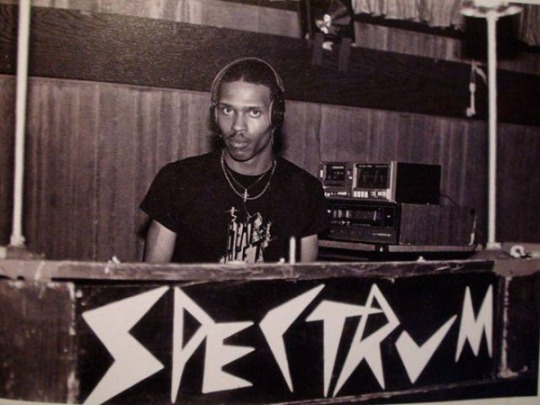
Today in Hip Hop History:
Keith Shocklee of The Bomb Squad was born January 2, 1962
#today in hip hop history#todayinhiphophistory#hiphop#hip-hop#hip hop#music#history#hip hop music#hip hop history#hip hop culture#music history#keith shocklee#bornday#birthday#the bomb squad#producer#music producer#public enemy#1962
117 notes
·
View notes
Text
youtube
Released in 1990, "The Emperor's New Clothes (Hank Shocklee Mix)" as sung by the late and truly great Sinéad O'Connor and remixed by Public Enemy and BOMB SQUAD co-founder, Hank Shocklee

0 notes
Text
‘Nation Of Millions’: Why Public Enemy’s Masterpiece Cannot Be Held Back
“Some hip-hop groups release their most popular and best album the first time out. That was just one convention Public Enemy refused to follow. Released on April 14, 1988, It Takes A Nation Of Millions To Hold Us Back was PE’s second album. The title was drawn from a line in one of their debut album’s songs, but the group’s sophomore effort blew its predecessor away with its sheer power. That’s saying something, because Yo! Bum Rush The Show was a killer record in its own right. If they’d released only Yo!, Public Enemy would have remained hip-hop cult heroes. But It Takes A Nation Of Millions To Hold Us Back made Public Enemy legends, cultural icons, and representatives of the cutting-edge of Black music. ...”
udiscover (Video)
2009 May: Public Enemy, 2011 July: It Takes a Nation of Millions to Hold Us Back, 2012 February: Fear of a Black Planet, 2012 August: Apocalypse 91… The Enemy Strikes Black, 2012 December: A Dozen Pivotal Moments in the 30 Year Career of Public Enemy, 2014 June: "Prophets of Rage" (2011), 2015 February: The Noise And How To Bring It: Hank Shocklee Interviewed, 2015 May: Give it up (1994), 2015 September: Shut'em Down (1991), 2018 June: White Heat Can’t Melt Black Steel: Public Enemy's Nation Of Millions Revisited

0 notes
Text

#HIP HOP LEGEND ✨ #THE BOMB SQUAD 💣
#KEITH SHOCKLEE 💿🎼🌹💘👑🎤✨
0 notes
Text
Legendary Producer Keith Shocklee on Being Part of Hip-Hop's Pre-History
Throughout our hourlong dialog on the roof of mid-town Manhattan’s Starchild Rooftop, legendary rap producer Keith Shocklee veers by his encyclopedic information of hip-hop historical past. Shocklee was round hip-hop earlier than the tradition had even coined itself. He’s hottest for being a component of Public Enemy’s six-man Bomb Squad manufacturing group along with his brother Hank Shocklee,…
View On WordPress
0 notes
Text
Legendary Bomb Squad Producer Keith Shocklee Celebrates 50 Years Of Hip Hop At Starchild Rooftop
Legendary Bomb Squad Producer Keith Shocklee Celebrates 50 Years Of Hip Hop At Starchild Rooftop
0 notes